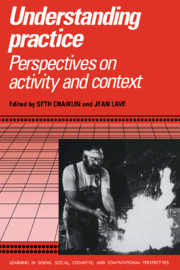Book contents
- Frontmatter
- Contents
- Series foreword
- List of contributors
- Part I Introduction
- Part II Learning craftwork
- 2 Learning to navigate
- 3 Developmental studies of work as a testbench of activity theory: The case of primary care medical practice
- 4 Re-searching psychotherapeutic practice
- 5 Thinking and acting with iron
- 6 Artificial intelligence as craftwork
- 7 Behavior setting analysis of situated learning: The case of newcomers
- Part III Learning as social production
- Part IV Conclusion
- Author index
- Subject index
- Learning in Doing: Social, Cognitive, and Computational Perspectives
4 - Re-searching psychotherapeutic practice
Published online by Cambridge University Press: 06 January 2010
- Frontmatter
- Contents
- Series foreword
- List of contributors
- Part I Introduction
- Part II Learning craftwork
- 2 Learning to navigate
- 3 Developmental studies of work as a testbench of activity theory: The case of primary care medical practice
- 4 Re-searching psychotherapeutic practice
- 5 Thinking and acting with iron
- 6 Artificial intelligence as craftwork
- 7 Behavior setting analysis of situated learning: The case of newcomers
- Part III Learning as social production
- Part IV Conclusion
- Author index
- Subject index
- Learning in Doing: Social, Cognitive, and Computational Perspectives
Summary
In this chapter I shall outline an approach to the analysis of psychotherapeutic practice. The resulting analytic framework is geared to be a countermeasure against the current impasse of research and practice and to redirect its development. The analytic categories for this “re-search” are provided by the historical paradigm of “critical psychology” (systematically exposed by Holzkamp, 1983). They are employed upon three interconnected avenues of empirical inquiry:
Studies of audiotaped casework, including regular interviews with clients and other parties, directly or indirectly involved, concerning relations between their everyday life contexts and the ongoing therapy.
Studies of audiotapes and notes from my practice as a therapist and supervisor (Dreier, 1980, 1986a, 1987a).
Studies of transcripts from a series of regular conferences between researchers and practitioners, analyzing issues of professional psychological practice on the basis of critical psychology (Dreier, 1983, 1986b, 1988a, 1989; Dreier, Kleinmanns, Konitzer-Feddersen, Michels, & Raitola, 1988; Holzkamp, 1988; Markard, 1988; Moll, Bohm, Vathke, & Dreier, 1985).
I shall not particularize my analysis of these data here. Instead, I shall build a multilevel argument resting upon them. In the course of laying out this argument, I shall introduce a number of central analytic categories from critical psychology deployed to construct it. It is the objective of these analyses to capture both what is the matter with current therapeutic practice and what the parties involved need to think about and do to improve it. My argument will highlight issues at four levels of analysis in turn: the participating subjects, their situated interaction, the societal mediation of what takes place, and the restriction versus the extension of the subjects' practice.
- Type
- Chapter
- Information
- Understanding PracticePerspectives on Activity and Context, pp. 104 - 124Publisher: Cambridge University PressPrint publication year: 1993
- 6
- Cited by



